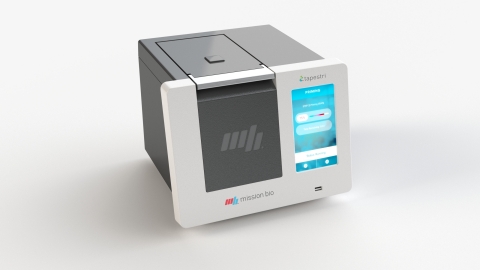CHICAGO--(BUSINESS WIRE)--Mission Bio, Inc., a leader in single-cell DNA analysis and precision genomics, today announced at the American Association for Cancer Research 2018 annual meeting multiple premier cancer centers have added the Tapestri platform to their laboratories. Leading institutions including The National Cancer Institute, Icahn School of Medicine at Mount Sinai, MD Anderson Cancer Center, Memorial Sloan Kettering Cancer Center, St. Jude Children's Research Hospital, University of California-San Francisco, the University of Pennsylvania, and Washington University School of Medicine in St. Louis have purchased the world’s only Precision Genomics Platform for high throughput single-cell DNA analysis to help better understand how clonal heterogeneity may impact treatment selection and patient outcomes.
Tapestri is able to identify single-nucleotide variants (SNVs) and indels, two types of genetic variants that are especially relevant to precision medicine. The unambiguous identification of these variants at disease-relevant sites in the genome is potentially of the utmost importance to informing treatment decisions.
On Tuesday, April 17, from 3:00-4:00 p.m. CDT at Spotlight Theater B, Mission Bio will host a special presentation titled, “The Next Era in Single-Cell Genomics and Precision Medicine,” featuring new data from Catherine Smith, M.D., from UCSF Helen Diller Family Comprehensive Cancer Center on how single-cell analysis uncovers heterogeneous resistance mechanisms and clonal selection, while Aaron Viny, M.D., of Memorial Sloan Kettering Cancer Center will present data on applying single-cell DNA techniques to examine clonal heterogeneity and minimal residual disease.
"No technology prior to Tapestri has been able to give us the resolution to decipher co-occurring mutations in the same clones,” said Dr. Smith of UCSF. “These insights are especially important in our study of resistance mechanisms and combinatorial therapies in key clinical trials.”
Tapestri Expands Capabilities to Include Hiseq, Solid Tumor Profiling
Also at the AACR 2018 annual meeting, Mission Bio unveiled new product updates to Tapestri, making it compatible with HiSeq 2500 for multiplexing multiple samples and larger panels, in addition to the previously supported MiSeq, as well as releasing new panels for myeloid disorders and solid tumor profiling.
The new Tapestri Single-Cell DNA Myeloid Panel targets SNVs and indels across 47 driver genes with relevant mutations. It is designed to cover a comprehensive set of myeloid disorders including acute myeloid leukemia (AML), myelodysplastic syndrome (MDS), myeloproliferative neoplasms (MPN), chronic myeloid leukemia (CML), chronic myelomonocytic leukemia (CMML), and juvenile myelomonocytic leukemia (JMML).
The new Tapestri Single-Cell Tumor Hotspot Panel targets hotspots across 50 oncogenes and tumor suppressor genes relevant in a range of different solid tumors with SNV and indel mutation detection. It has already been tested with breast, lung, prostate, and colorectal nuclei from fresh frozen tissue samples.
These updates follow the launch of Tapestri Custom Panels in February 2018, an industry-first single-cell DNA capability that allows researchers and clinicians to focus on the genetic mutations most impactful to their research. With a throughput of up to 10,000 cells per run, Tapestri Custom Panels are compatible with a wide variety of samples including cell lines, PBMCs, bone marrow, and fresh frozen solid tissue nuclei, enabling researchers to examine a range of complex diseases to fully resolve clonal heterogeneity and mutational co-occurrence, something previously impossible with bulk sequencing.
“The theme of AACR 2018 is ‘Driving Innovative Cancer Science to Patient Care.’ This theme is at the center of our mission statement as a company to do our part to give scientists and clinicians the research tools they need to beat cancer,” said Charlie Silver, CEO of Mission Bio. “The addition of these world-class institutions to the Mission Bio family, along with the new product updates, will make sure we are doing everything we can to further knowledge of disease acquisition and progression and how it should be treated in order to win this battle together.”
The Tapestri platform is based on the pioneering droplet microfluidics expertise from the UCSF lab of Adam Abate, Ph.D., and includes an instrument, consumables and software. Tapestri, which debuted in October 2017, is a scalable, highly sensitive and customizable Precision Genomics Platform. Leveraging proprietary microfluidics with throughput up to 10,000 cells and DNA accessibility at the single-cell level, researchers and clinicians can now identify with unprecedented scale and sensitivity the important differences among cells within a patient sample that may impact disease progression and treatment.
Mission Bio has received several grants from the NIH, NSF and NHGR supporting its work in single-cell biology. In October 2017, the company announced its Series A funding to support the commercialization of Tapestri.
Mission Bio is exhibiting in booth # 1345 during AACR 2018. For more information on Tapestri, including videos and images, please visit the company’s website.
About Mission Bio, Inc.
The Mission Bio Tapestri platform provides researchers a precision genomics platform to support the discovery, development and delivery of precision medicine. Our proprietary droplet microfluidics platform enables scalable detection of genomic variability with access to DNA at the single-cell level. The Tapestri platform includes our instrument, consumables and software, which plug seamlessly into existing NGS workflows. With Mission Bio, researchers have a highly sensitive and customizable solution that is fully supported to enable meaningful discoveries. missionbio.com twitter.com/MissionBio linkedin.com/company/3882975/




